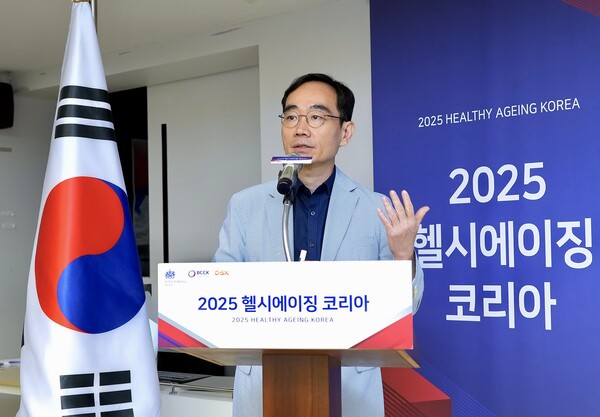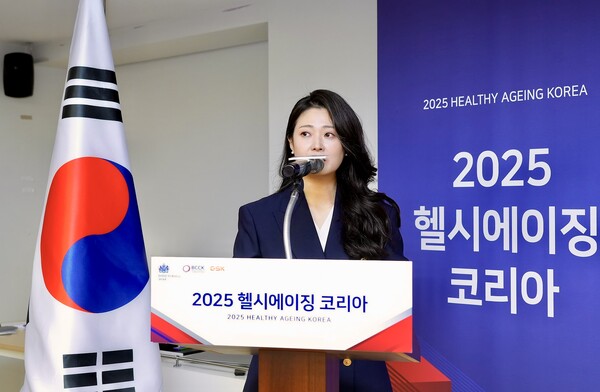
South Korea is hurtling toward a super-aged future, yet its adult vaccination program has barely shifted in a decade. Experts say that with only two shots covered for older adults, the country is leaving millions exposed to preventable diseases that could swamp its healthcare system.
The warning came Tuesday at the “2025 Healthy Ageing Korea” forum at the British Embassy in Seoul, co-hosted with GSK Korea. As of 2025, more than one in five Koreans will be over 65. By 2072, nearly half are projected to be. Those aged 85 and above will grow sixfold, from under a million to more than 5 million.
Longevity is a measure of progress, health officials agree, but one that comes with rising chronic illness, faltering immunity and an “open door” to infections that can turn deadly.
Kim Kwang-il, a professor of geriatrics at Seoul National University Bundang Hospital (SNUBH), has been watching the gap between life expectancy and healthy life expectancy widen.
Speaking at the forum, he said Koreans “are living longer but spending too many of those years in poor health.” That gap, in his view, will pull the country toward a fiscal cliff if the system remains fixated on treatment rather than prevention.
Gunnar Riediger, GSK Korea’s newly appointed country manager, called the demographic shift “a turning point” that will demand a redesign of health policy and priorities. Prevention, he said, should come before treatment, and that includes broadening the national immunization program for older adults.
It is a stance that dovetails with his company’s portfolio. GSK now markets both Shingrix, its shingles vaccine launched in Korea in December 2022, and Arexvy, the first RSV vaccine for older adults, introduced in May after winning regulatory approval late last year.
Both address diseases that exact a heavy toll on seniors and on the health system when left unchecked.
That toll is precisely what concerns Lee Han-kil, a professor of pharmaceutical sciences at Ewha Womans University. In Spain, she pointed out, the cost of treating four vaccine-preventable diseases runs into the billions each year. “We could have saved a lot of that money with vaccines,” she said at the Tuesday forum, then paused before adding, “and our own bill is coming due.”

Costs and coverage collide in Korea’s race to vaccinate its aging population
Lee's economic models put the return on shingles vaccination at more than 1.5 to 1, and RSV at 1.65 to 1 -- gains she called “a rare case where public health and fiscal health point in the same direction.”
In Korea’s National Immunization Program for adults, only influenza and pneumococcal vaccines, specifically the 23-valent pneumococcal polysaccharide vaccine, are free for seniors.
That is a far cry from the United States, where Medicare covers at least six, including shingles and RSV. The U.K.’s NHS offers a similar breadth, while Japan and Australia subsidize or fully fund multiple adult shots. Korea has not added a single new adult vaccine since 2013.
The U.K.’s Office of Health Economics estimates that adult vaccination can yield up to $19 in benefits for every $1 spent. Most of that, Lee noted, comes not from preventing death but from “avoiding long hospital stays, avoiding complications, avoiding the moment when a treatable infection tips a fragile patient into permanent disability.”
The obstacle is not the evidence but the budget. The Korea Disease Control and Prevention Agency’s (KDCA) Lee Hyung-min, director of the Division of Immunization Policy, did not mince words: vaccinating everyone over 60 against shingles would cost more than his agency’s entire annual budget.
“We can’t do this alone,” he said, explaining that the decision would require the Ministry of Health and Welfare, the National Health Insurance Service and local governments, along with what he called “a broad social consensus” about who should pay.
That consensus, he argued, will not come if vaccination is framed as a private choice. “We cannot expect older adults, many already living in poverty, to carry the cost,” he said. Korea’s elderly poverty rate is nearly triple the OECD average; a high out-of-pocket price, he warned, “means lower uptake and higher inequality.”
Some municipalities already run their own vaccination drives, but the programs are patchy, tied to local budgets. In one province, Professor Lee noted, older adults can get free shingles shots; in another, they must pay in full. “Where you live decides whether you’re protected,” she said -- an arrangement she called indefensible in a universal health system.
The government is studying co-payment models used overseas. In Japan, costs are split among the national government, municipalities and individuals; in France and Singapore, patients pay a fraction of the cost with heavy state subsidies. “Given how many of our cities are already doing this piecemeal, a co-managed system between the central and local governments is entirely possible," Professor Lee said.
Others are thinking even more laterally. Song Jae-chan, secretary general of the Korean Senior Citizens Association, floated the idea of levies on health-harming products -- much like Korea’s tobacco tax -- to finance adult vaccination. “Sugary drinks, junk food, alcohol, could end up paying for healthier old age.” he said in an offhand remark.
International comparisons deepen the sense of urgency. Shingles vaccination is now routine for older adults in most high-income countries; RSV coverage is spreading fast in the U.K., Canada and the U.S. In Korea, both are out of reach for most unless they pay out of pocket.
The missed opportunity is not only to spare individuals pain but to protect the system’s capacity. Kim recalled last winter’s bed shortages. “If you take just a few thousand severe respiratory cases out of the wards,” he said, “you free the space for strokes, for heart attacks -- for the things we can’t prevent.”
For now, Director Lee said the KDCA plans to publish a manual later this year on how vaccines are evaluated for inclusion in the NIP and what evidence manufacturers must provide. It is also weighing phased rollouts and cost-sharing schemes. But the clock is ticking.
Professor Lee likes to say that prevention is “a choice only if you ignore the math.” In a rapidly aging Korea, she added, the real choice is whether to invest now or “pay far more later, in both lives and in won.”
Related articles
- Geriatricians urge mandatory RSV and enhanced flu vaccines for older adults
- GSK rolls out RSV vaccine Arexvy in Korea, targeting older adult market
- RSV poses greater risk than flu for older adults, expert warns
- New risk score predicts elderly patient complications with 84% accuracy
- 6 medical societies call for introducing a national shingles vaccination program
- SNUBH researchers unveil world’s 1st real-time global skin disease map
- Korea urges G20 to strengthen global cooperation for universal health coverage
- Is Korea’s 1-million-won RSV vaccine worth the price?
- GSK Korea's RSV vaccine expands indication to benefit high-risk people in their 50s

